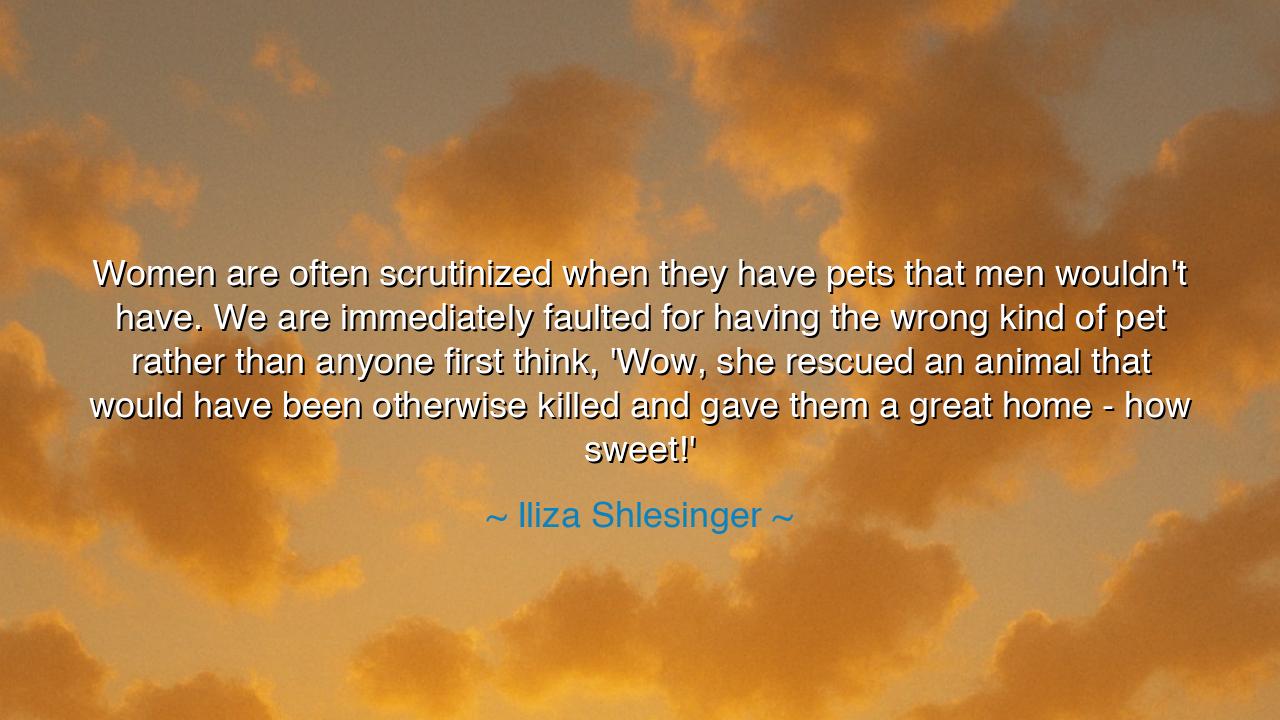
Women are often scrutinized when they have pets that men
Women are often scrutinized when they have pets that men wouldn't have. We are immediately faulted for having the wrong kind of pet rather than anyone first think, 'Wow, she rescued an animal that would have been otherwise killed and gave them a great home - how sweet!'






"Women are often scrutinized when they have pets that men wouldn't have. We are immediately faulted for having the wrong kind of pet rather than anyone first think, 'Wow, she rescued an animal that would have been otherwise killed and gave them a great home – how sweet!'" Thus spoke Iliza Shlesinger, comedian and sharp observer of the world, yet also a truth-teller whose words pierce beyond laughter into justice. In this saying, she unveils the double burden placed upon women: that even in compassion, even in the act of rescuing life, they are judged not for their mercy but for how that mercy appears to others.
The ancients, too, wrestled with this cruel paradox. In their writings, women who nurtured and cared were often praised only when they fit the molds of propriety, but when their compassion extended in unusual ways, they were scorned. A queen who raised lions was called eccentric; a widow who fed the hungry was mocked for strangeness. Yet what Shlesinger reminds us is timeless: the true measure of a person is not in whether their kindness conforms to expectation, but whether that kindness saves life and brings light into the world.
Her mention of pets is not trivial. The pet is a symbol of vulnerability, of creatures that rely on us for survival. To adopt, to rescue, is an act of love. But in her words we see the tragic flaw of society: instead of praising the act, it focuses on appearances. A man may keep a strange animal and be called daring; a woman may do the same and be called odd, reckless, or foolish. Here is revealed the ancient injustice of the double standard—one law for the strong, another for the judged.
History offers us an example in Florence Nightingale, who tended not only to soldiers in war but also to wounded animals in her later life. Some scoffed at her compassion, saying she wasted time on creatures rather than keeping to the proper roles of her station. Yet her care, both for men and beasts, became a legacy of mercy that reshaped the world. The criticism was forgotten; the kindness endured. So too with Shlesinger’s words: what seems trivial—the choice of a pet—is in fact a window into whether society values appearance or the deeper act of compassion.
There is also heroism in this statement. For to rescue the unwanted, the unloved, the creatures deemed unworthy, is to stand against the tide of indifference. It is to declare that life itself has value, regardless of whether it is celebrated by society. The woman who rescues such an animal bears not only the labor of care but also the scorn of others—and yet she perseveres. In this, she becomes not eccentric but noble, not foolish but brave.
O children of tomorrow, take this teaching into your hearts: when you see an act of compassion, praise it, no matter how unusual its form. Do not be quick to judge the appearance of kindness, but honor the heart behind it. For it is better to be mocked for saving life than to be praised for doing nothing. Let your first thought be gratitude, not suspicion, when you see others extending mercy.
Therefore, let us cast aside the chains of shallow judgment. Let us remember that compassion, wherever it is found, is holy. Whether in the rescue of a dog, a bird, a reptile, or the smallest creature, the act is one of courage. For true greatness lies not in conforming to expectation, but in daring to give love where love is least expected.
Thus the teaching of Iliza Shlesinger endures: that even in the face of scrutiny, kindness is never wasted. The world may mock, but history will remember the ones who saved life when others turned away. Choose compassion over convention, mercy over mockery, and in doing so, you will walk the eternal path of those who make the world gentler for all living things.






AAdministratorAdministrator
Welcome, honored guests. Please leave a comment, we will respond soon